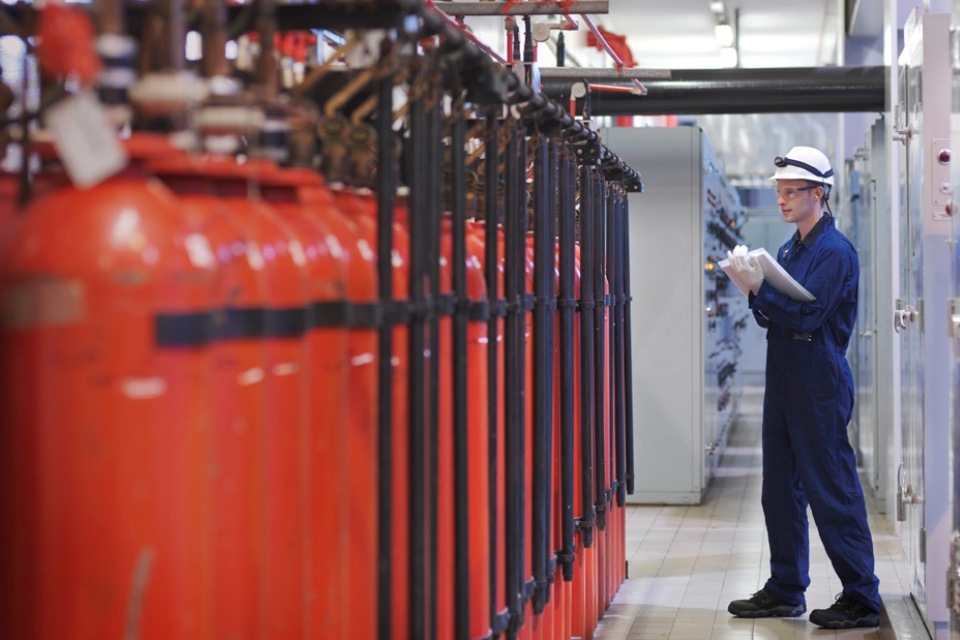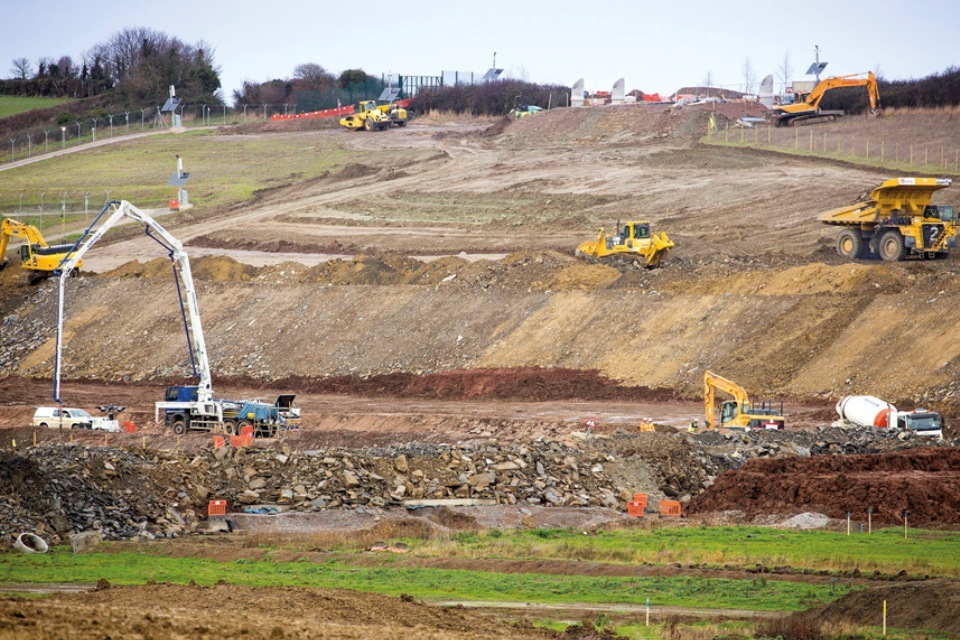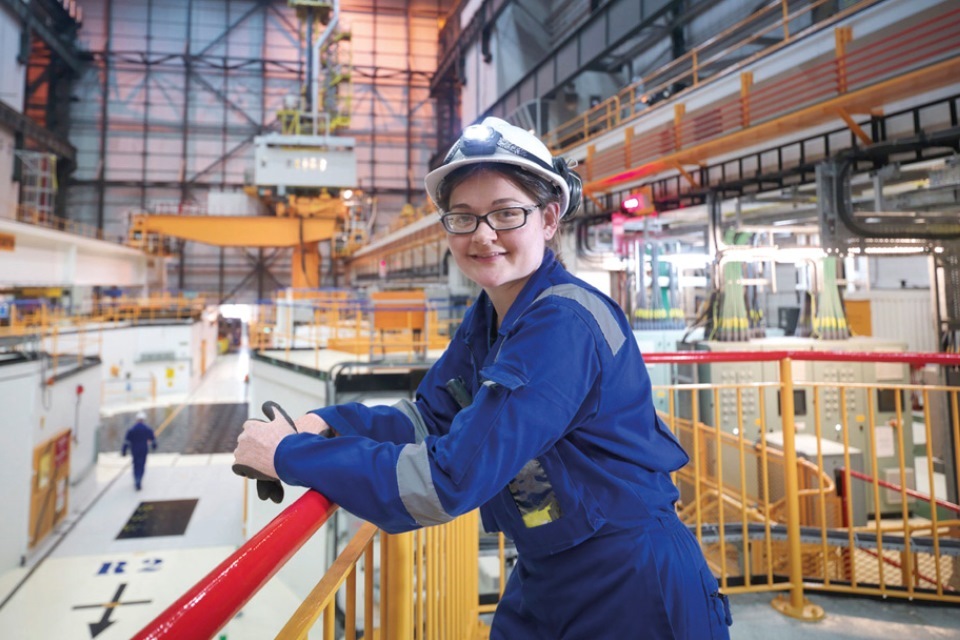UK nuclear : Powering the future
Published 26 January 2015
Introduction
The UK is a global leader in the nuclear industry, a position built up through 60 years’ safe delivery of nuclear energy.
The UK has had a thriving nuclear industry since the 1950s, when the world’s first commercial nuclear power station was opened in Cumbria. Nowadays, the UK offers capability and expertise across the entire nuclear life cycle, from the design of new plant to decommissioning and waste management. Employing more than 60,000 skilled professionals, with a single-minded focus on safety and quality, the UK is the partner of choice in nuclear energy developments around the world.
A pioneer in nuclear technology, the UK is home to some of the world’s leading nuclear companies and a mature and flexible supply chain.
A world-class partner across the fuel cycle
The UK is leading European nuclear development with plans for over ten reactors in the next decade and a half.
Worldwide nuclear power capacity could grow to as much as 722GW by 2030 according to the International Atomic Energy Agency (IAEA).
At the same time, many nuclear plants across the world are approaching the end of their working lives and will need to be decommissioned. In the next 15 years, around 50–60 reactors are expected to be dismantled in the European Economic Area alone, with many others closing down in East Asia, the former Soviet Union and North America.
With over 60 years’ experience of dealing with all aspects of nuclear generation, the UK supply chain can make a vital contribution to these programmes. With expertise spanning the nuclear fuel cycle the UK can support both those about to embark on new nuclear initiatives, as well as countries looking at safely closing their existing facilities.
A pioneer in nuclear technology, the UK is home to some of the world’s leading nuclear companies and a mature and flexible supply chain, with a long track record of planning, design and construction, operations and monitoring and life extension and decommissioning.
The sector’s 60,000 highly trained workers provide a wide variety of skills, from specialist engineering disciplines and expert knowledge of regulatory requirements through to project management, cutting-edge research and first-class safety and systems expertise.
Many UK companies are market leaders in their specialist field, ranging from the suppliers of large pumps to cooling water and marine-works design consultants. Others have set the industry standard, in areas such as radiation detection and monitoring. They are also experienced in delivering the key professional services needed to underpin a nuclear programme, including the provision of top-quality legal advice, education, training and skills assistance and financial consultancy.

© Aquila Nuclear Engineering
The UK is also one of very few countries with experience in several different reactor technologies, as well as having developed a state-of-the-art inspection regime. In addition, the UK has world-class facilities for undertaking highly active experiments and trials, enabling it to provide industry-wide technical support.
Drawing on this expertise, and with the full support of the UK government, UK nuclear companies have become the trusted partners of choice in many markets around the world, playing major roles in nuclear programmes in Asia, Europe and North and South America.
Building for the future
The UK is at the forefront of the European nuclear renaissance, with plans for up to 16GW of new nuclear reactors from 2023 onwards.
UK companies have a strong track record in programme management with contracts globally.
UK companies are highly experienced in developing the safety case for the construction and operation of a proposed nuclear plant.
The new build programme is leading to major investment in the UK supply chain, which will contribute to all three of the key areas required to support a new-build programme:
- programme management and technical support
- engineering and construction
- provision of plant and equipment
- safety
With no reactor design vendor of its own, the UK is ideally placed to offer independent advice and assistance on all aspects of system selection. In addition, advances in programme and project management, construction techniques and innovative financing arrangements have substantially improved the delivery of major UK projects in recent years – experience which could prove hugely beneficial to overseas nuclear programmes.
Some of the UK’s largest companies also have the capability to work with partners to offer packages which include engineering, manufacturing and construction activities. Such a process is already underway in the UK new-build programme, with major British firms acting as partners with EDF Energy, Alstom, Areva, Horizon Nuclear Power and Hitachi-GE. UK companies have also been selected as partners on a range of overseas projects.

Hinkley Point C site © EDF Energy
Programme management and technical support
The UK has the experience and expertise to deliver all the activities involved in nuclear programme management and technical support, from inception through to commissioning and handover.
UK capability includes:
- advising on legislative and regulatory frameworks
- interpreting IAEA and national requirements and guidance
- undertaking economic and technical studies into the feasibility of new plant
- advising on site selection and infrastructure design
- planning and environmental consultancy
UK companies have a strong track record in programme management, with contracts across Europe and the US. They are also experienced in delivering the key professional services needed to underpin a nuclear programme, including the provision of top-quality legal advice; education, training and skills assistance; and financial consultancy.
Nuclear Services
Rolls-Royce can deliver high value-added products and services across the nuclear cycle using extensive experience built on safety, reliability and world-class engineering. The company provides nuclear services and solutions to around half of the world’s operational reactors.
Supporting manufacturers
The Nuclear Advanced Manufacturing Research Centre (Nuclear AMRC) combines academic innovation with industry expertise to help UK manufacturers meet the demands of the civil nuclear industry for new build, operations and decommissioning. It works with companies along the supply chain, from top-tier manufacturers through to small specialist suppliers.
Instrumentation
Delta Controls has for over 40 years provided quality instrumentation for a wide range of reactor types.
The company has built a reputation for helping clients to select the correct instrument types to meet the technical requirements of the application as well as meeting the seismic and radiation levels. Delta’s products, which include pressure, flow and temperature transmitters and switches, have been supplied to all the UK’s nuclear fleet, as well as nuclear stations in Canada, China, Finland, India, South Korea, Spain, Sweden and the US.
Other services offered by UK companies include:
Insurance cover
Insurance is necessary to safeguard the asset values and nuclear liability requirements of contractors and their clients. UK companies can assist in providing nuclear insurance from the UK or help local insurance operations arrange appropriate cover.
Nuclear safety and licensing advice
UK companies are highly experienced in developing the safety case for the construction and operation of a proposed nuclear plant. They can work with prospective licensees to establish processes and procedures to demonstrate licence condition compliance, as well as provide verification on commissioning and handover.
Information and communications technology (ICT) systems
The use of information technology is fundamental to the design, building, operation, safety and decommissioning of modern power plants. The UK has many specialist companies who have an excellent track record in providing ICT services.
These range from initial computer-aided design to fuel-cycle management and ‘back office’ systems such as human resources and billing.
Fuel-cycle services
The UK has an impressive pedigree in fuel-cycle services, as well as offering a closed nuclear fuel-cycle capability for all light water and gas-cooled reactor types. This includes the manufacture of oxide fuels for AGR and LWR reactors, the manufacture of uranium hexafluoride and the specialist transportation of nuclear materials such as fuels, spent fuel and waste. The UK has considerable experience of recycling spent fuel to recover uranium and plutonium for reuse, and the manufacture of mixed oxide fuel. In addition, the UK possesses radioactive waste management capabilities, including conditioning, packaging and storage.
Strategic partners
Atkins has provided business-critical engineering solutions to the nuclear sector for more than five decades. In the UK, Atkins is a strategic partner to EDF Energy and Urenco UK, and has provided Generic Design Assessment support to global vendors entering the UK.
Outside the UK, Atkins is well positioned in the USA and in the UAE where they have advised the Emirates Nuclear Energy Corporation since 2011.
Water services
Ovivo and its predecessor companies have been providing equipment and solutions to the nuclear industry in the UK and around the world for over five decades. Its capabilities include water-intake screening systems, condenser-protection debris filters and tube-cleaning systems; high-purity water systems for boiler feed and condensate polishing; and wastewater treatment systems and storage pond treatment.
Current overseas projects include Ningde nuclear power plant in China, Olkiluoto 3 in Finland and Lungmen in Taiwan.
Fuel and Nuclear services
Westinghouse runs the Springfields nuclear fuel manufacturing plant in North West England, which has produced almost all the fuel for the UK’s nuclear fleet over more than half a century. The company also provides a full complement of nuclear services to keep AGR, PWR and BWR reactors operating safely, as well as fully integrated services and solutions to the decommissioning, dismantling and waste management industries, and dynamic solutions for spent fuel services.
Forgings
Sheffield Forgemasters is a world leader in the provision of high-quality heavy forged and cast-steel products. In recent years, it has produced unique pump casings for the latest generation of Chinese AP1000 plants at Sanmen and Haiyang, as well as delivering safety-critical components to French, Russian and US-designed nuclear plants.
Imaging specialist
Mirion Technologies is a leading provider of specialised imaging systems for the international nuclear industry, with products to suit applications in every part of the nuclear fuel cycle. Mirion’s inspection and surveillance systems provide a broad range of versatile cameras with multiple lens options, viewing angles and lighting attachments, allowing operators to perform tasks in low to high-radiation environments.
Civil engineering and construction
UK companies have the experience, expertise and management capability to deliver all the construction elements of a new nuclear plant.
Particular strengths include:
- design support
- architectural design
- cooling water works/marine works
- civil construction site management

Engineers © iStockphoto
Plant and equipment
A new nuclear power facility requires a wide range of plant and equipment, from specialised equipment such as safety valves and stainless-steel pump casings for the reactor to conventional items like tankage and pipework.
Boasting extensive nuclear engineering, manufacturing and site installation capability, the UK can supply much of the plant and equipment required for a new site. UK specialist equipment manufacturers have a long history of supplying to the global nuclear new build market and are ideally placed to offer plant and assistance no matter what the station type and design code.
The UK has market-leading companies in the following areas:
- pumps and valves
- high-quality forgings
- water treatment services
- plant instrumentation and control for the reactor, generating plant and ancillary equipment
- specialised equipment and services
- accumulators, tanks and heat-removal systems
- high-integrity piping systems
- fuel-transfer tubes and key interlock systems
- validation of advanced NDT, inspection and materials
- nuclear plant operational waste measurement instrumentation
- radioactive waste management systems, including encapsulation plant; radwaste stores; and encapsulation plant and equipment manufacture and installation
- VAC systems design, safety assessment and implementation management, and manufacture of components
Valve companies
Weir Group’s expertise spans the design and manufacture of critical isolation, control and safety valves on the nuclear island, through to general isolation and control applications for balance of plant. Weir has supplied valves to the nuclear industry since 1956, and was the first UK company to be awarded the ASME N Stamp in 1979.
Today, Weir continues to build on its extensive proven global installed base and its specialist maintenance support, from its four nuclear classified manufacturing facilities and its strategic service hubs. Weir is successfully supplying and maintaining a number of nuclear-generation projects with critical safety and conventional plant on PWRs and BWRs in Europe, South Korea, China, North America and elsewhere.
Thompson Valves – an ASME N-Stamp company – is providing and maintaining safety-related valves for the UK’s current AGR fleet and PWR plant. The company is also supporting reactors overseas, including CANDU PHWRs (Canada, Romania, China, Argentina and South Korea), BWRs (Sweden and Finland), PWRs (Belgium, China and Slovenia) and VVERs (China, Czech Republic, Finland and Slovakia).
Flowserve – Flow Control UK has been supplying highly engineered valves to the UK’s nuclear industry for almost 50 years. Awarded the ASME III ‘N’ stamp, the company’s ball valves can be installed into all nuclear plant piping systems, including the nuclear island. Flowserve products have been supplied to a number of recent nuclear power projects in Europe and Southeast Asia.
Maximising performance
The UK has built up huge experience in underpinning the safe, reliable operation of nuclear plant across the fuel cycle, developing the necessary technical solutions to maintain and extend their lives and maximise their performance.
As a result, a highly skilled engineering resource has been created, well-versed in the stringent codes required for nuclear projects. This is already being deployed to provide major benefits to existing nuclear programmes overseas. Other projects have covered technical improvements, major retrofitting/refurbishment of main plant and networks, new operations practices, sophisticated monitoring and complex decision analysis on a range of nuclear technologies worldwide.
The UK nuclear industry is in a strong position to offer support across the following key areas:
- safety/emergency preparedness/licensing consultancy
- fault analysis
- power uprating and maintenance/on-site assistance
- outage management
- life-extension consultancy and implementation
- commercialisation/privatisation advice
- laboratory facilities
- research and development
- fuel services
- ICT systems
- software products and support services, ie in the areas of reactor physics, criticality, shielding, dosimetry, heat transfer, stress analysis and fluid flow

© Monty Rakusen/Getty Images
Meeting the challenge
AMEC has been working with customers to provide a full range of services spanning the entire lifecycle of their assets for more than 60 years. It has over 3,300 nuclear specialists around the world taking prominent roles in new reactor design, new-build programmes and optimising solutions for waste management and decommissioning challenges. AMEC has played a key role in the design and build of every civil nuclear power station in the UK, is a strategic partner to EDF Energy and is a partner in Nuclear Management Partners, the parent body organisation for Sellafield – the largest civil nuclear decommissioning contract in the world.
Programming pioneers
The UK’s National Nuclear Laboratory has designed a programming tool (Orion) to assist in understanding the implications of following different reactor and fuel-cycle scenarios. This has been used to underpin the UK’s nuclear industrial and R&D strategies, and for modelling advanced fuel-cycle technologies for the US Department of Energy.
Radiation Monitoring
Centronic’s neutron detectors are used for reactor flux monitoring in the instrumentation and control of CANDU, AGR, MAGNOX, PWR, TRIGA and VVER reactors worldwide. The company’s Geiger Muller tubes are used extensively in dosimetry and protection of assets and personnel throughout the fuel cycle, while its radiation-tolerant cameras lie at the heart of high-integrity vision systems both for NPP operation and fuel reprocessing plants.
Centronic has built fast neutron detectors to monitor the movement of fissile material at facilities throughout Europe, and has developed unique neutron-gamma probes to provide environmental monitoring within the safe confinement for unit 4 at Chernobyl in Ukraine.
Enrichment services
URENCO is a market leader in uranium enrichment services and supplies more than 50 customers in 19 countries. By remaining responsive to clients’ changing requirements, URENCO provides them with the services they need to generate low-carbon nuclear energy.
Service specialists
Doosan Babcock has helped keep the UK AGR fleet running through a range of specialist services, including operations maintenance and plant-life extension, decommissioning and waste-handling services. It also supports the maintenance, refueling and plant upgrade activities on the UK’s only PWR reactor. The company has been a pioneer in developing and demonstrating the application of ultrasonic non-destructive examination techniques in the nuclear industry, providing these services to leading utilities in countries such as Argentina, France, Russia, Sweden, Switzerland and Ukraine.
Valve innovation
Truflo (an IMI plc business) has a long heritage in designing specialist valves for critical applications. It designed, manufactured and validated a new valve that enabled EDF Energy to make additional safety improvements to the primary cooling circuits at the UK’s Hinkley Point B and Hunterston B AGR reactors.
Decommissioning and clean-up
Decommissioning and waste management is one of the most sensitive aspects of the nuclear cycle.
It needs to be handled safely and efficiently – to world-class standards – if a nuclear programme is to retain public and political support and be economically competitive.
The UK is a world leader in decommissioning civil nuclear power reactors and associated facilities. The decommissioning and clean-up of over 10 first-generation UK Magnox power stations is well underway, as is that of a range of other facilities.
The UK’s Nuclear Decommissioning Authority, specifically established to supervise this work, is currently spending over £3 billion per year on such programmes. In addition, baseline decommissioning plans have been drawn up for all current operational plant.
As a result, the UK has an established decommissioning supply chain with substantial expertise and experience, capable of dealing with all aspects of the safe and efficient clean-up of nuclear facilities. Using these skills and resources, many UK companies have already secured significant overseas contracts in Europe, Russia and the US.
The UK has also been providing support to the clean-up effort in Japan following the Fukushima Daiichi accident, with expert advisors on key boards. UK decommissioning capability has been recognised at a high level, with government-to-government co-operation and many exchange visits highlighting areas where the UK’s unique experience can be brought to bear on the technical and management challenges posed.
UK companies can contribute to all the following areas:
- site management
- management and operations activities
- engineering consultancy
- plant decommissioning, decontamination and dismantling
- radiation mapping and nuclear waste characterisation and measurement services
- probabilistic risk-assessment techniques
- containment and radiological protection products
- transportation/storage and disposal of radioactive waste and spent fuel
- safety management services, including complete safety-case preparation
- environmental restoration
- environmental assessment and management of radioactive waste facilities
- research and development
- fuel services
- ICT systems
UK companies have developed a range of cutting-edge technologies that can assist decommissioning and waste management. Examples include advanced cranes with remote manipulator arms; shielded transfer flasks for the import/export of radioactive materials; and remote non-electrical radiation monitoring devices.
Clean-up
Nuvia UK has been the UK Department of Energy & Climate Change’s project management consultant on the G8 Global Partnership Initiative project concerned with the safe and secure management of fuel at Andreeva Bay in Russia since 2002. More recently, it was awarded the contract to provide the Programme Management Unit responsible for overseeing the final decommissioning of the Kozloduy nuclear power station in Bulgaria, in an agreement that also covers the construction of the Bulgarian national waste repository.
Crane creators
Lifting experts CGR Group were commissioned to design and build a robotic mini crane with a remote manipulator arm for use in the decommissioning of the UK’s Sellafield plant. This was used to stabilise and remove redundant pipework from a high-radiation zone without damaging the surrounding facility architecture.
Flasks and doors
Tata Steel has been involved in the nuclear industry for over 50 years, providing a full range of services. From one of the largest engineering facilities in the UK, it supplies flasks, gamma gates, shield doors, waste boxes, security doors and cranes to exacting industry standards. It also offers a bespoke test rig design, build and operating service.
Decommissioning savings
Cavendish Nuclear is the UK’s largest nuclear services business, responsible for decommissioning many of the country’s sites. These include the former fast reactor R&D site at Dounreay, where innovation is delivering savings in both time and cost on one of the most complex clean-up challenges in the world.
Safety certification
Lloyd’s Register is providing independent third-party certification of the management systems for the UK’s Nuclear Decommissioning Authority and Sellafield Ltd. The company’s Risk Spectrum Probabilistic Safety Assessment (PSA) software is used in more than 50% of the world’s nuclear power stations, while the firm has also conducted safety analysis in Sweden for SKB’s waste management facilities and spent fuel repository. In addition, Lloyd’s Register has worked on nuclear projects in countries such as India, Japan, Netherlands, South Korea and the UAE.
Managing waste
Nuclear Engineering Services supplied a remote powered manipulator to Dounreay Site Restoration Limited to carry out a number of essential waste packaging and consignment activities. These included segregation into intermediate-level waste and low-level waste, prior to consignment into the appropriate waste port.
Reducing costs
Aquila designed, manufactured and installed a shielded transfer flask and an import/export facility for the Nuclear Decommissioning Authority’s Chute Silo Project at Berkeley. The contract demonstrated how pragmatic engineering can reduce decommissioning costs significantly: simplification of the design reduced the budget by 40% and 50% respectively.
Research and development
UK research and innovation was at the heart of the very first commercial nuclear power plant over half a century ago, and the UK remains a leading force on the global nuclear research landscape today.

Fusion reactor scientist
Some of the best nuclear R&D facilities in the world are located in the UK. Notable examples include the National Nuclear Laboratory’s Central Laboratory in Cumbria, which represents a £250 million investment in state-of-the-art nuclear research capability, equipped to handle uranium, plutonium, spent fuel, highly active waste and advanced fuels containing – for example – thorium. The UK research community embodies vast expertise across the whole fuel cycle in all its forms – thermal and fast reactors; oxide, nitride, carbide and metallic fuels; water-cooled, gas-cooled and liquid metal-cooled systems; reprocessing; waste management; decommissioning; and so on.
The UK has many nuclear experts, who are among the recognised global authorities in their technical fields of knowledge. The National Skills Academy for Nuclear and the National Nuclear Laboratory are working together, along with the Dalton Nuclear Institute, to develop the next generation of these technical specialists and ensure their knowledge and experience are retained and shared.
The academic network in the UK is also among the most respected globally, with around 1,000 academics and postgraduate researchers from some of the world’s best universities actively involved in a wide range of nuclear research and education.
The UK’s research and development capabilities are world-leading with over 10,000 man-years within the National Nuclear Laboratory alone.
The UK has research assets of over £1 billion of state-of-the-art world-class research facilities.
Legal leaders
Given the sensitive and highly regulated nature of the nuclear process, top-quality legal advice is vital at all stages, from initial feasibility studies through to the development of decommissioning programmes. The UK legal profession is well placed to advise on all of these areas.
In recent years, much work has been undertaken in the UK on establishing the framework for new nuclear build, and in developing the arrangements for decommissioning. In the case of the former, this work has involved devising a streamlined process for consents, a strategic siting assessment process and a generic design assessment regime. In addition, the UK has established a system to support nuclear new build, and other renewable generation projects, by way of a ‘Contract for Difference’. This guarantees a price for the life of a project by providing a payment to the generator if the market price is below the ‘strike price’, and requires the generator to pay money back to consumers if the market price goes above this threshold. This is a valuable tool to help give certainty to developers.
Furthermore, the UK has established a workable framework for decommissioning, including the creation of the Nuclear Decommissioning Authority and arrangements for funded decommissioning programmes. Using this experience, UK-based lawyers have been able to make a significant contribution to overseas nuclear programmes, transferring the ‘technology’ of the new structures and advising in the context of other legislative systems.
They have also been able to advise on the legislative and other requirements necessary to facilitate the new build of nuclear power plant, including licensing, safety and supply-chain issues, as well as ‘contracts for difference’.
Some of the specific areas on which UK legal companies can provide world-class advice include:
- identification and acquisition of new-build sites
- domestic and international regulatory issues
- contractual and regulatory architecture for projects of all kinds
- subsequent implementation through contracts for construction, operation and maintenance, fuel supply and transportation, and power offtake; and the range of contracts for participation in the energy market, project development and financing
- development of joint ventures, including dispute avoidance and resolution
- decommissioning issues, including funded decommissioning plans
- planning management and disposal issues
Industry advisers
Burges Salmon has significant experience in international nuclear law, notably in decommissioning, new build, operations and waste. It is a particular specialist in the legal/ regulatory aspects of both the fuel and plant life cycles and has advised governments, operators, developers and all tiers of the supply chain. Burges Salmon has recently taken the lead role in the UK’s two largest decommissioning contracts for Dounreay and Magnox, while, overseas, the firm is advising on projects in Africa, Asia and Europe.
Global reach
Freshfields has worked closely with the world’s leading nuclear players for over 30 years. It advises globally on new generation and fuel-cycle projects, including consortia creation, licensing, nuclear liability, construction, financing, decommissioning and dispute resolution. Recent work includes structuring Europe’s largest new-build project at Moorside and advising URENCO on its worldwide enrichment business.
Nuclear know-how
CMS Cameron McKenna’s extensive nuclear experience started in 1988 with its work on the restructuring of the UK electricity system, including the separation of nuclear generation. More recently, it has advised EDF Energy on its nuclear new-build programme and RWE on its investment in nuclear, while the law firm’s expertise has also been sought in areas such as decommissioning in Slovakia and the statutory and regulatory structure for the UK’s Electricity Market Reform programme.
Award-Winning Nuclear Practice
Herbert Smith Freehills LLP advises on all aspects of the nuclear sector, in the UK and internationally, including nuclear new build, privatisations and restructurings, national and international regulatory frameworks, decommissioning and clean-up, and nuclear financing. Currently it is advising long-standing client EDF Energy on the Hinkley Point C project, for which it was awarded “Infrastructure and Projects Legal Team of the Year 2014” in The Lawyer Awards. Overseas, the company’s advice has been sought on nuclear projects in Abu Dhabi, France, Jordan, Lithuania, Romania and Russia.
Skills and education support
A key prerequisite for any nuclear programme is world-class education and training to underpin skills development. Without this, no nuclear programme can be undertaken safely, economically and efficiently.

Training in the nuclear sector (c) Cultura Creative (RF)/Alamy
The UK’s capability in this area has been developed over many years and is second to none. Through collaboration with industry, and funding through the country’s Research Councils, universities, higher education institutions and further education colleges, the UK has developed a comprehensive suite of education and training programmes to support the nuclear power industry, at all academic levels.
With regards to Continuous Professional Development, the UK has developed a wide range of training courses and experiential learning to enable nuclear-industry personnel to acquire the relevant skills and know-how to work more effectively.
UK nuclear employers have developed a unique collaborative approach – the National Skills Academy for Nuclear (www.nsan.co.uk) – to ensure the maintenance and development of a skilled, safe and competent workforce. This is already making a major contribution to delivering the UK’s current and future nuclear programmes and could provide overseas companies with similar benefits.
A key achievement has been the development of a ‘Nuclear Skills Passport’ which drives up the standards of the workforce and facilitates the transfer of skills between nuclear sites and programmes. This approach provides a system for recording and evidencing skills development and training and has recently been expanded to incorporate a comprehensive Competency Framework.
Programme provider
The UK’s National Skills Academy for Nuclear has developed a country-wide High Quality Provider Network which delivers industry-specific programmes at all levels from vocational and technical training to post- graduate study, both in the UK and internationally. Access to nuclear-related skills development and training has recently been enhanced by the development of an online learning portal: www.nucleartrainingnetwork.com.
Enhancing education
The Nuclear Universities Consortium for Learning, Engagement and Research was established in 2011 to:
- widen academic and industrial collaboration and enhance knowledge transfer
- facilitate access to unique nuclear research facilities in the UK and overseas
- support government, regulators, industry and academia in the development of nuclear programmes
- promote UK capability and knowledge internationally
Master classes
A postgraduate ‘one-stop shop’ for a range of Masters courses is run by the Nuclear Technology Education Consortium, which is made up of a group of UK universities and higher education institutions. The breadth and format of the training is designed to meet the UK’s projected nuclear skill requirements in new build and reactor technology, decommissioning and geological disposal.
Financial advisory services
The expected growth in nuclear new build and decommissioning services in the coming years will require the investment of considerable capital both in the plant itself as well as the supply chain.

Meeting © iStockphoto
Governments across the world are looking to the private sector to provide finance and UK companies are ideally placed to offer the necessary advice to facilitate this investment. The City of London is the world’s leading financial centre. UK financial advisors can offer expertise in the following areas:
Market assessment and understanding
- market assessment and advice
- developing terms for power purchase agreements
- assessing the economics of financial support and environmental/sustainability mechanisms developed by government
Business structuring and finance raising
Development of appropriate structures for project finance, joint ventures and to fund the working capital requirements both for investment in new generation and the supply chain.
Supply-chain selection
Assessing whether a potential contractor has the financial robustness and longevity to deal with the scale and long-term duration associated with nuclear new build.
Transactions advice
Helping clients with reorganisation and transactions in the supply-chain project delivery.
Project delivery
Ensuring that the appropriate financial and project controls are in place throughout a project life cycle.
Decommissioning and disposal
Supporting both governments and developers to structure appropriate funding regimes to meet long-term storage or disposal obligations as part of a whole-life financial solution.
Tailored advice
Deloitte’s nuclear energy group has an in-depth understanding of the industry and its key players in the UK and internationally, and a track record of delivering tailored financial advisory, consulting, tax and audit services. It combines sector expertise with a global footprint to advise on industry issues from new build to nuclear fuel and decommissioning.
The company has carried out numerous nuclear-related assignments overseas, in countries such as Bulgaria, China, Japan, Jordan, Poland, Saudi Arabia, South Africa and the US.
Global experts
PricewaterhouseCoopers has advised on all aspects of the nuclear life cycle in the UK, Africa, Asia, Europe, the Middle East, Russia and the US. Areas of expertise include project strategy; structuring, financing and business and regulatory systems implementation for new build; the operation of new and existing plant; uprates; life extensions and preparation for and implementation of decommissioning and waste management.
Industry insight
KPMG provides integrated advisory support right across the nuclear value chain in areas such as strategy, business planning and programme development and implementation, as well as commercial structuring and financing. In addition to supporting projects in the UK, the company has been involved in major international nuclear programmes in Canada, Finland, Japan, Poland, Romania, Saudi Arabia, South Africa, the UAE and the US.
Regulatory advice
EY provides financial, project, policy and regulatory capabilities from new nuclear build (NNB) through to decommissioning services. It advised the UK government on the new W&D framework, is an ICO partner to a leading NNB developer and is engaged by investors and developers in the UK and globally.
The company has been instrumental in reforming the Nuclear Installations Inspectorate and Civil Nuclear Constabulary, and provides advice on areas ranging from environmental resources management and supply-chain management to operational performance improvement and remuneration strategy. It also has significant end-of-life project experience, from programme management of the decommissioning of the Ignalina plant in Lithuania, advising South Africa’s Pebble Bed Modular Reactor programme, to lifetime baseline cost assessments with the Nuclear Decommissioning Authority.
How Department for International Trade (DIT) can help
DIT is the government department that helps UK-based companies succeed in the global economy. It also helps overseas companies bring their high-quality investment to the UK’s dynamic economy, acknowledged as Europe’s best place from which to succeed in global business. DIT has professional advisors both within the UK and across more than 100 international markets.
If you are a UK-based company looking to develop your business in overseas markets or an overseas client looking for UK suppliers of world-class products and services, then please contact us for expert advice and practical support.
UK Export Finance
UK Export Finance (UKEF), the UK’s export credit agency, is the government department that works with companies, banks and overseas buyers to support financing of UK exports and investments across the world. UKEF provides protection to UK exporters against payment risks and facilitates finance for them through guarantees to banks. It also supports and provides loans to overseas buyers to finance the purchase of capital/semi capital goods and services from the UK.
UK Export Finance is the trading name of the Export Credits Guarantee Department (ECGD).
Call: +44 (0)20 7215 5000
Email: nuclear.enquiry@trade.gov.uk
Nuclear Industry Association
The NIA is the trade association for the civil nuclear industry in the UK, representing more than 270 companies across the supply chain. The diversity of its membership enables effective and constructive industry-wide interaction. The NIA believes nuclear energy is essential to meet the UK’s future clean energy needs. Together with renewables, clean coal and energy efficiency, nuclear can reduce carbon emissions. As part of a diversified energy mix, modern nuclear-generated energy can provide safe and reliable sources of power for UK homes, hospitals, schools and industries.
NIA member companies also have significant expertise in nuclear decommissioning and clean-up, with 19 nuclear sites in the UK currently being managed through the process.
The NIA’s objectives are to:
- improve the commercial performance of the nuclear industry by supporting member companies to develop their businesses in the UK and overseas
- engage with the public, media and political spheres to promote better understanding of nuclear energy and its role within a low carbon energy mix
Call: +44 (0)20 7766 6640
Email: info@niauk.org
Disclaimer
Whereas every effort has been made to ensure that the information in this document is accurate DIT does not accept liability for any errors, omissions or misleading statements, and no warranty is given or responsibility accepted as to the standing of any individual, firm, company or other organisation mentioned.
© Crown copyright 2015
This publication is licensed under the terms of the Open Government Licence v3.0 except where otherwise stated. To view this licence, visit nationalarchives.gov.uk/doc/open-government-licence/version/3 or write to the Information Policy Team, The National Archives, Kew, London TW9 4DU, or email: psi@nationalarchives.gsi.gov.uk.
Where we have identified any third party copyright information you will need to obtain permission from the copyright holders concerned.
This was published originally by UK Trade and Investment which has since moved to the Department for International Trade (DIT).
